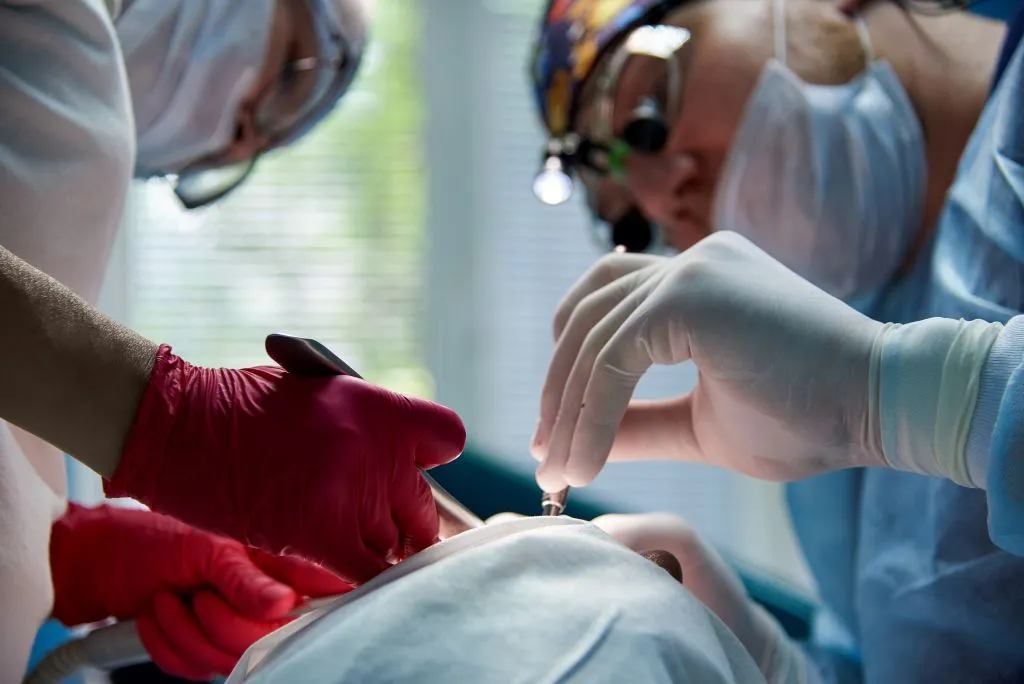1. What is a Gum Graft?
Involves taking tissue from one area of the mouth, such as the palate, and grafting it onto areas of the gums that have experienced recession or damage. This helps to restore gum tissue volume, cover exposed tooth roots, and improve gum health and aesthetics.
2. Who Needs to Have Gum Grafting?
Individuals who have experienced gum recession due to factors such as periodontal disease, aggressive brushing, or genetic predisposition may benefit from gum graft surgery. Additionally, those with tooth sensitivity, aesthetic concerns, or increased risk of dental problems due to gum recession may be candidates for this procedure.
3. How Common is Gum Graft Surgery?
Surgery is a common procedure performed by periodontists and oral surgeons to address gum recession and improve oral health. It is often recommended for individuals with significant gum tissue loss or damage.
4. Procedure Details:
During gum graft surgery, the dentist or oral surgeon numbs the affected area with local anesthesia. They then carefully remove tissue from the palate or another donor site and attach it to the areas of the gums in need of repair. The graft is secured in place with sutures, and the healing process begins.
5. How Long Does Gum Graft Surgery Take?
The duration of gum graft surgery varies depending on the extent of the procedure and the number of grafts needed. On average, the surgery can take anywhere from one to two hours to complete.
6. Does Gum Graft Surgery Hurt?
While some discomfort and swelling are common after gum graft surgery, the procedure itself is performed under local anesthesia to minimize pain and discomfort. Patients may experience mild soreness or sensitivity in the days following surgery, which can be managed with pain medication and proper post-operative care.
7. What Happens After Gum Grafting?
After surgery, patients are advised to follow specific post-operative instructions provided by their dentist or oral surgeon. This may include avoiding hard or spicy foods, practicing good oral hygiene, and attending follow-up appointments to monitor healing progress.
8. Risks / Benefits:
Like any surgical procedure, gum graft surgery carries certain risks, including infection, bleeding, and graft failure. However, the benefits of gum grafting can outweigh these risks, as it can improve gum health, reduce tooth sensitivity, enhance smile aesthetics, and prevent further gum recession and tooth loss.
9. Recovery and Outlook:
Most patients experience a gradual improvement in gum health and appearance in the weeks and months following gum graft surgery. Full recovery may take several weeks, during which time the gums will heal, and the graft will integrate with the surrounding tissue. With proper oral hygiene and regular dental care, the long-term outlook following gum grafting is generally favorable.
10. When to Call the Doctor:
Patients should contact their dentist or oral surgeon if they experience severe pain, excessive bleeding, persistent swelling, or signs of infection, such as fever or pus discharge, after gum graft surgery. Prompt medical attention may be necessary to address any complications and ensure optimal healing.
11. A Note from Cleveland Clinic:
As a leading medical institution, Cleveland Clinic emphasizes the importance of seeking expert dental care for gum recession and related issues. Gum graft surgery is a valuable treatment option that can help restore gum health and enhance overall oral well-being.
Gum graft surgery is a beneficial procedure for individuals experiencing gum recession or tissue loss. By understanding the procedure details, risks, and benefits outlined in this article, patients can make informed decisions about their oral health and seek appropriate care from qualified dental professionals.
 Latinosenairdrie.ca
Latinosenairdrie.ca
